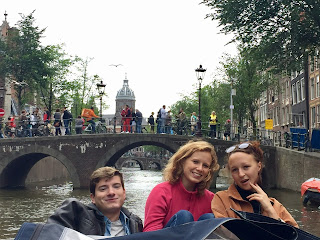By Vojtech Brezik
Kosovo, Kosovo…so much has been said about it, yet there remain so many questions, awaiting so many answers. Never before have I had the chance to just pause my life for an an entire month and focus my mind on one single thing. Perhaps more importantly, who’d have ever thought that one day, for me and 19 of my fellow students, that single thing would be that tiny place in the middle of the Balkans: Kosovo. You might have noticed one word I used to describe my life: pause. Truly, it was (and, in a way, still is) as if everything in my life just paused for this month. Try it someday. Cease everything you’re doing and focus your mind and efforts on one specific task for an extended period of time. Looking back, how did it feel? Upon our return to Amsterdam, some of us felt empty inside, others lonely, and still others immediately missed the lovely people that accompanied us on our journey. For just a moment, the boat trip helped us nurture and sustain the feelings and memories of friendship, being together, eating and drinking together, and—perhaps most importantly—mutual love. Three days later, Anne welcomed us to class with those words: “Back to reality.” At that moment, we all knew it was time to shift gears.
Kosovo, Kosovo…so much has been said about it, yet there remain so many questions, awaiting so many answers. Never before have I had the chance to just pause my life for an an entire month and focus my mind on one single thing. Perhaps more importantly, who’d have ever thought that one day, for me and 19 of my fellow students, that single thing would be that tiny place in the middle of the Balkans: Kosovo. You might have noticed one word I used to describe my life: pause. Truly, it was (and, in a way, still is) as if everything in my life just paused for this month. Try it someday. Cease everything you’re doing and focus your mind and efforts on one specific task for an extended period of time. Looking back, how did it feel? Upon our return to Amsterdam, some of us felt empty inside, others lonely, and still others immediately missed the lovely people that accompanied us on our journey. For just a moment, the boat trip helped us nurture and sustain the feelings and memories of friendship, being together, eating and drinking together, and—perhaps most importantly—mutual love. Three days later, Anne welcomed us to class with those words: “Back to reality.” At that moment, we all knew it was time to shift gears.
However, “pause” doesn’t reflect the lasting effect this experience will have had on so many aspects of our lives in the future, once we stop to look back and think about what we learned and saw. This trip offers a chance to get to know the people around you in a way you never could in a classroom setting. Not only to get to know them, but to live with them, eat with them, share all your moments with them. Given the task at hand, you know that you have become a part of something big and important. When Anne said to us: “We are living the lives that many of these people wish for,” I realised that there is a certain responsibility that we have towards everyone we spoke with, everyone we visited, everyone who hosted us and, perhaps most importantly, everyone who looked up to us with hope. If nothing else, it is a responsibility to learn and to share what we’ve learned, which is why we’ve been writing our diaries for the whole time, why we’ve been talking about everything we’d been through, why everyone asks you “How was Kosovo?”, and also why I’m writing this post.
Even if I tried, I couldn’t explain “how Kosovo was” in its entirety. Even though the intensity of the trip gives you literally zero time for yourself, in a way, it is still very personal and intimate. Everyone returns with a thing, a memory, an experience special to them, be it seeing a drunk, crazy student twerking on stage, or the Imams' call to prayer. I have been going to Croatia for all my life with my family, and this trip felt like that too. It was like going to a different home, with a different family.
“You might not know it yet, but one day, you guys will change the world.” Thank you, Anne, and thank you, everyone who shared this with me.











